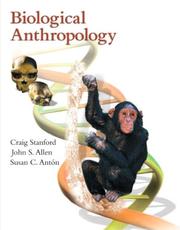| Listing 1 - 4 of 4 |
Sort by
|
Book
ISBN: 9780674035348 0674035348 0674053494 9780674053496 9780674064058 0674064054 Year: 2012 Publisher: Cambridge, Mass. The Belknap Press of Harvard University Press
Abstract | Keywords | Export | Availability | Bookmark
 Loading...
Loading...Choose an application
- Reference Manager
- EndNote
- RefWorks (Direct export to RefWorks)
Though we have other distinguishing characteristics (walking on two legs, for instance, and relative hairlessness), the brain and the behavior it produces are what truly set us apart from the other apes and primates. And how this three-pound organ composed of water, fat, and protein turned a mammal species into the dominant animal on earth today is the story the author seeks to tell in this book. Adopting what he calls a bottom-up approach to the evolution of human behavior, the author considers the brain as a biological organ; a collection of genes, cells, and tissues that grows, eats, and ages, and is subject to the direct effects of natural selection and the phylogenetic constraints of its ancestry. An exploration of the evolution of this critical organ based on recent work in paleoanthropology, brain anatomy and neuroimaging, molecular genetics, life history theory, and related fields, this book shows us the brain as a product of the contexts in which it evolved : phylogenetic, somatic, genetic, ecological, demographic, and ultimately, cultural-linguistic. Throughout, the author focuses on the foundations of brain evolution rather than the evolution of behavior or cognition.
Brain --- Human evolution. --- Evolution. --- Growth. --- Evolution (Biology) --- Physical anthropology --- Evolutionary psychology --- Human beings --- Origin --- Affective and dynamic functions --- Evolution. Phylogeny --- Physiology of nerves and sense organs
Book
ISBN: 0674055721 0674069870 9780674069879 9780674064737 0674064739 9780674055728 Year: 2012 Publisher: Cambridge, MA
Abstract | Keywords | Export | Availability | Bookmark
 Loading...
Loading...Choose an application
- Reference Manager
- EndNote
- RefWorks (Direct export to RefWorks)
In this gustatory tour of human history, John S. Allen demonstrates that the everyday activity of eating offers deep insights into human beings' biological and cultural heritage. We humans eat a wide array of plants and animals, but unlike other omnivores we eat with our minds as much as our stomachs. This thoughtful relationship with food is part of what makes us a unique species, and makes culinary cultures diverse. Not even our closest primate relatives think about food in the way Homo sapiens does. We are superomnivores whose palates reflect the natural history of our species. Drawing on the work of food historians and chefs, anthropologists and neuroscientists, Allen starts out with the diets of our earliest ancestors, explores cooking's role in our evolving brain, and moves on to the preoccupations of contemporary foodies. The Omnivorous Mind delivers insights into food aversions and cravings, our compulsive need to label foods as good or bad, dietary deviation from "healthy" food pyramids, and cross-cultural attitudes toward eating (with the French, bien sûr, exemplifying the pursuit of gastronomic pleasure).To explain, for example, the worldwide popularity of crispy foods, Allen considers first the food habits of our insect-eating relatives. He also suggests that the sound of crunch may stave off dietary boredom by adding variety to sensory experience. Or perhaps fried foods, which we think of as bad for us, interject a frisson of illicit pleasure. When it comes to eating, Allen shows, there's no one way to account for taste.
Brain --- Cognition. --- Diet --- Food habits --- Food --- Human evolution. --- Nutrition --- Omnivores. --- Omnivorous animals --- Animals --- Appetite --- Food preferences --- Evolution (Biology) --- Physical anthropology --- Evolutionary psychology --- Human beings --- Health --- Psychology --- Evolution. --- Psychological aspects. --- Origin
Book
ISBN: 0903485427 Year: 1977 Publisher: Hartington : Moorland,
Abstract | Keywords | Export | Availability | Bookmark
 Loading...
Loading...Choose an application
- Reference Manager
- EndNote
- RefWorks (Direct export to RefWorks)
Industrialització. --- Tecnologia --- Màquines de vapor. --- Màquines de vapor --- Història --- Història. --- Newcomen, Thomas.

ISBN: 0131828924 Year: 2006 Publisher: Upper Saddle River, N.J. Pearson/Prentice Hall
Abstract | Keywords | Export | Availability | Bookmark
 Loading...
Loading...Choose an application
- Reference Manager
- EndNote
- RefWorks (Direct export to RefWorks)
| Listing 1 - 4 of 4 |
Sort by
|

 Search
Search Feedback
Feedback About UniCat
About UniCat  Help
Help News
News